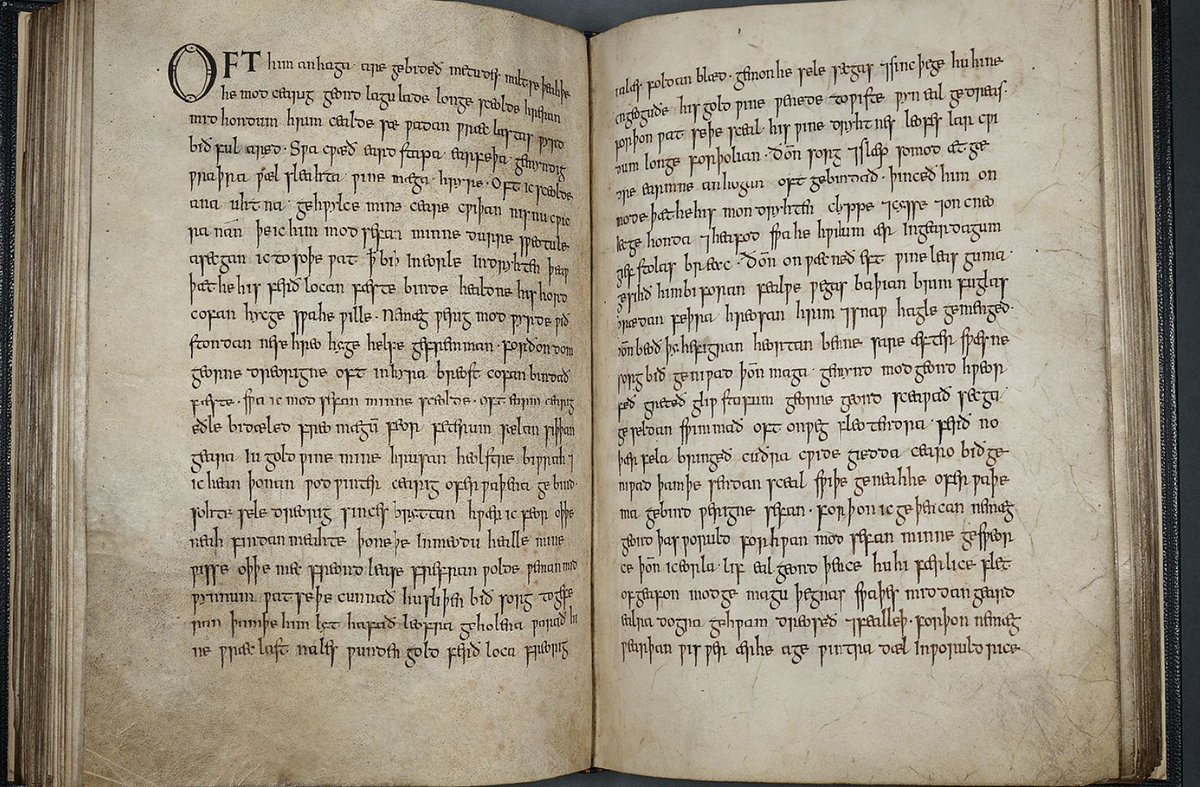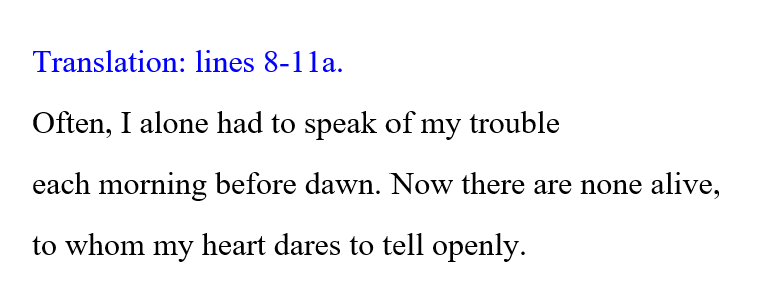As promised, here’s your mashup analysis of @LilNasX’s “That’s What I Want” and the 10th-century Old English poem called “The Wanderer” in time for #Pride.
Lets talk about queer love! A 🧵
1/29
#lilnasx #medievaltwitter #PrideMonth2022

Lets talk about queer love! A 🧵
1/29
#lilnasx #medievaltwitter #PrideMonth2022
https://twitter.com/ISASaxonists/status/1536790812054396929


The Wanderer is an Old English poem from the 10th-century preserved in an Old English anthology called the “Exeter Book.” This compilation has lots of poems – maybe we’ll discuss some others some day. Check out the manuscript here starting at f. 76v: theexeterbook.exeter.ac.uk/viewer.html
2/
2/
The anonymous medieval poet wasted no time dropping beats, it’s a short poem comprising 115 lines of alliterative verse. It’s an elegy, a poem abt sadness loss, longing, and desire. 3/ 

This sounds familiar. Oh wait, it is! Approx. 1000 yrs later @LilNasX's “That’s What I Want” echoes the beautiful & haunting theme of same-sex desire & longing reminiscent of “The Wanderer.”
Both song & poem are short & to the point. Let's take a look. #Pride 4/
Both song & poem are short & to the point. Let's take a look. #Pride 4/
The Wanderer’s main narrator is a man, a retainer, who’s exiled & longs to be in the presence of his lord who’s dead. He’s lonely, but sadness is not just bc he’s a dude missing his dead lord, his desires & longing are more intimate. 5/
In pre-Conquest England part of the culture was dominated by a warrior-class who was in the service of a chieftain or king. This was called “comitatus.” The comitatus vowed loyalty & military service in exchange for land, compensation, privileges, etc. 6/
“Comitatus” is understood to be more of a literary trope leaning into ‘kinship’, rather than historical accuracy.
It's interesting in “The Wanderer” the exiled warrior describes not just wanting to be in his lord’s presence. He conjures some homo-erotic feelings &visuals. 7/
It's interesting in “The Wanderer” the exiled warrior describes not just wanting to be in his lord’s presence. He conjures some homo-erotic feelings &visuals. 7/
Before we get too ahead of ourselves the pronouns in the poem make it clear that this is a man talking abt longing for another man. The opening narrator introduces the wanderer as “him” and when the wanderer speaks in 1st person, he refers to his lord as ‘he’ too. All males. 8/ 

Both main speakers in The Wanderer & “That’s What I Want" talk explicitly abt loneliness. One bit of the refrain in the song repeats as “These days, I'm way too lonely / I'm missing out, I know / These days, I'm way too alone.” /9
This refrain in "That's What I Want" is paralleled by the loneliness of the poem's wanderer whose thoughts of being with his lord remind him how lonely he now is. Lines 8-11a. 10/ 



The Wanderer’s narrator speaks of having to contain & bottle up those thoughts of desire. The torture of living “in the closet.” His emotions are indicative of something deeper. You can read more abt emotions & queer readings by Prof @Diane_Watt here: 11/
tandfonline.com/doi/full/10.10…
tandfonline.com/doi/full/10.10…
Prof. Watt’s article "A Fragmentary Archive: Migratory Feelings in Early AS Women’s Letters" delves into trauma & feelings of isolation. Specific focus in on women’s correspondence in early England, but she draws attn to emotions tied to moving passages w/in the Wanderer. 12/ 

The speaker in “That’s What I want” is explicit about what he wants and the object of his desire. @LilNasX's song flips the white, hetero-masculine narrative on its head. 13/ 

The imagery in the video is disruptive to heteronormative stereotypes. Pastel pink and blue football uniforms? Yes please.
@LilNasX’s video takes an ultra masculine sport – the object of his desire is on the football field. 14/
@LilNasX’s video takes an ultra masculine sport – the object of his desire is on the football field. 14/
In “The Wanderer,” the object of desire is also from an ultra-masculine warrior culture. This man misses his lord, but not for material reasons.
There’s an emotional bond – a love that he says noblemen usually keep to themselves. Ll. 11b-14
15/

There’s an emotional bond – a love that he says noblemen usually keep to themselves. Ll. 11b-14
15/


The speaker in “That’s What I Want” nails this point abt this desire only being in his dreams. The chorus repeats w/:
"I want (I) someone to love me / I need (I) someone who needs me/ 'Cause it don't feel right when it's late at night / And it's just me in my dreams" 16/
"I want (I) someone to love me / I need (I) someone who needs me/ 'Cause it don't feel right when it's late at night / And it's just me in my dreams" 16/
Ok, so here’s the kicker, there’s a sensual scene of two men embracing reflected in both The Wanderer & “That’s What I Want.” In the music video we see two lovers embrace. The Wanderer’s speaker describes what could be a homoerotic scene too (ll. 41-44).
17/


17/



There’s a clasp, a kiss, an embrace and then his head is in his lord’s lap. These ain’t just two bros hanging out, sounds like they may be letting it all hang out.
Just like in LilNas X’s song video things stop short of getting too hot ’n heavy in this scene. 18/
Just like in LilNas X’s song video things stop short of getting too hot ’n heavy in this scene. 18/
We are told in the Wanderer that this exiled man’s loving embrace is cut short because he wakes up (line 45). "Ðonne onwæcneð eft wineleas guma" (Then this friendly man wakes up again).
Just like the speaker in That’s What I want, “it’s just me and my dreams.” 19/

Just like the speaker in That’s What I want, “it’s just me and my dreams.” 19/


The Old English poem goes on for some length lamenting loneliness & how certain things are so worthless in this world. It really drives home the point about feelings of isolation w/o human connection. 20/
We interrupt this regular scheduled thread with a short detour. Does this passage from The Wanderer look familiar?
*Jeopardy music plays*
21/

*Jeopardy music plays*
21/


Time’s up. Here’s the translation. Sound familiar now? No?
As some of you know, JRR Tolkien was a scholar of Old English, so naturally, this little excerpt from The Wanderer ended up in the mouth of Aragorn in LotR, Book II, chap. 6, in the Lament for the Rohirrim.
22/
As some of you know, JRR Tolkien was a scholar of Old English, so naturally, this little excerpt from The Wanderer ended up in the mouth of Aragorn in LotR, Book II, chap. 6, in the Lament for the Rohirrim.
22/

While we’re discussing Tolkien, he wasn't happy w/ the title given to the anon 10th-century poem & argued for alternative names to “the Wanderer” but none of them stuck. Read more in Prof. Stuart Lee’s article “Tolkien & the Wanderer” here:
muse.jhu.edu/article/266271…
23/
muse.jhu.edu/article/266271…
23/
Anyway, back to our main comparative analysis. When the speaker in “That’s What I Want” realizes he can’t have the man he desires the scene cuts to a church. The chorus becomes a liturgy, a prayer. 24/
In “The Wanderer” the narrator at the beginning reappears to tell us our only hope is in the “Fæder on heofonum” (father in the heavens) (l. 115a).
Likewise, The speaker in That’s What I Want finds his voice from his elder, the incomparable Billy Porter. @theebillyporter 25/
Likewise, The speaker in That’s What I Want finds his voice from his elder, the incomparable Billy Porter. @theebillyporter 25/
Overall, there are beautiful parallels btween the 10th-c. poem The Wanderer & LilNasX’s “That’s What I Want.” For decades, scholars resisted doing queer readings of the poem, dismissing some outright. Like our field’s struggles w/ racism, it’s been deeply homophobic too. 26/
Thankfully, many scholars have forged ahead, creating a path forward in queer/medieval studies. One exceptional piece outlines the history of homophobia in the field, highlights queer figures in early England, & offers a beautiful tribute
27/
27/
to a graphic designer & AIDS activist who wrote under the pseudonym “Beowulf Thorne." You can read/download @erik_kaars latest article which is open access here: muse.jhu.edu/article/856425…
#medievaltwitter #Pride
28/
#medievaltwitter #Pride
28/
To summarize, themes of longing, loneliness & same-sex desire connect LilNas X’s That’s What I Want & "The Wanderer".
Aueer love in the 21st c. & queer love in the 10th c.
That’s a wrap. Pls line up in single file & exit the thread in an orderly fashion. Class dismissed. 29/
Aueer love in the 21st c. & queer love in the 10th c.
That’s a wrap. Pls line up in single file & exit the thread in an orderly fashion. Class dismissed. 29/
P.S. If you don’t have access to any of the readings listed, just shout. And if you are interested in more on The Wanderer see here:
Some further Old English links if you are interested. See Professor Peter Baker’s site: oldenglishaerobics.net/wanderer.php
and
anglo-saxons.net/hwaet/?do=get&…
Some further Old English links if you are interested. See Professor Peter Baker’s site: oldenglishaerobics.net/wanderer.php
and
anglo-saxons.net/hwaet/?do=get&…
One more thing, if you like this thread, check out another Old English poem/@LilNasX mashup I did last year:
https://twitter.com/ISASaxonists/status/1378040214703202304
@threadreaderapp unroll s'il vous plait
• • •
Missing some Tweet in this thread? You can try to
force a refresh















